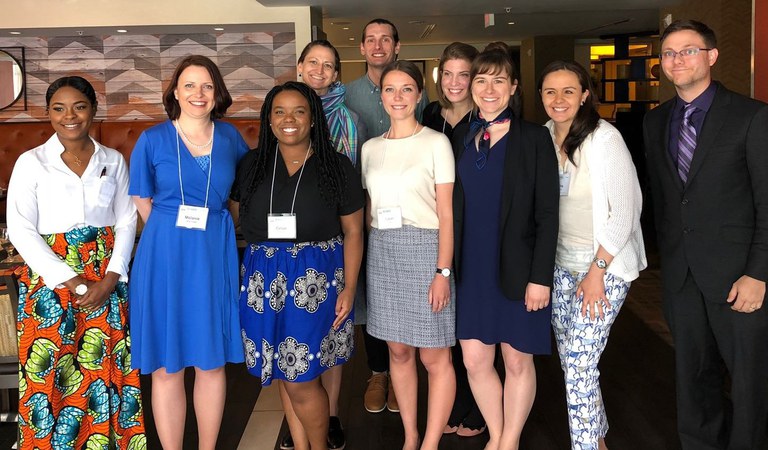Posted: June 27, 2018
Matthew Hancock, M.S. student in International Agriculture and Development (INTAD) and Rural Sociology, shares his perspective on the annual meeting of the Association for International Agriculture and Rural Development (AIARD).
A few weeks ago, I along with several other INTAD students, had the opportunity to attend the 54th annual meeting of the Association for International Agriculture and Rural Development (AIARD) in Washington DC. This year's meeting centered on the topic of: Business as "Unusual": Aligning Critical Intersections of Food, Agriculture and Health. As in years before, members gathered to present innovative initiatives aimed to continue the core values of AIARD: Increasing cooperation in international development and promoting awareness of the importance of agriculture in global development.
As a first-time attendee I was impressed by the level of importance given to students and young professionals looking to establish themselves in the field and having the opportunity to present their work and receive feedback from outstanding members of the international development community. For example, Penn State's own Maria Mazin presented during Monday afternoons lightning talks session on her ongoing research in the implementation of the Health Behavioral model in developing and implementing integrated pest management strategies with Hispanic and Latino farm workers.
It was also exceptionally beneficial for students to attend the career workshop that was hosted Sunday evening. Being able to participate in an engaging forum with panelist representing both private and government development agencies (DAI, USAID, CRS, DEVEX) provided indispensable insight for those in the audience who are currently surveying, or soon to enter, the job market.
Many of the speakers at this year's conference spoke to common themes that have been part of ongoing discussions throughout the INTAD program. One of the highlights of my experience was Chris Barrett speaking to the need for increased interdisciplinary cooperation in his talk: "Engaging Higher Education Disciplinary Expertise and Businesses Systems Approaches to Tackle Agri-Food and Health Challenges." I view development as a cooperative enterprise and believe that supporting interdisciplinary research is the way forward in tackling the burgeoning challenges of international agriculture and development. Another personal highlight was hearing of the array of gender-based initiatives across agencies and organizations. One of the most inspiring initiatives for me comes from Pakistan through WEinSPIRE and Chemonics International. This project aims to promote and increase women's economic empowerment and community leadership specifically focused in husbandry and micro-finance initiatives in the hopes of incentivizing market inclusion and rural development in Southern Punjab.
The closing meeting, led by incoming president and vice president Gretchen Neisler and Tom Gill, spoke to the importance of AIARD's continued commitment to the future leader's forum and the establishing of the $5,000 Future Leader Forum scholarship that was established through this year's conference and received by PSU Ph.D. student Elisabeth Garner. This year's conference highlighted the importance of increased involvement and developing membership strengthening initiatives through public, private and university outreach. For those interested in gaining experience in the organizations business, both Chuck Chopak of DAI, chair of the membership committee and Samantha Alvis of USAID, chair of the communications committee both expressed the importance of participation in a strictly volunteer role organization.
Being a freshman attendee, and member, of AIARD I speak from a very limited perspective, but I will say there will be staunch competition for future conferences when it comes to the reception myself and other accompanying students received. We were offered nothing but support and guidance from more senior members, and I would say that any student interested in pursuing a degree or career in international agriculture and development would be a welcome addition to the AIARD family.
Matthew Hancock
INTAD
Address
Melanie Miller Foster106 Agricultural Administration Building
University Park, PA 16802
- Email mjm727@psu.edu
- Office 814-863-0249
- Fax 814-865-3055
INTAD
Address
Melanie Miller Foster106 Agricultural Administration Building
University Park, PA 16802
- Email mjm727@psu.edu
- Office 814-863-0249
- Fax 814-865-3055


